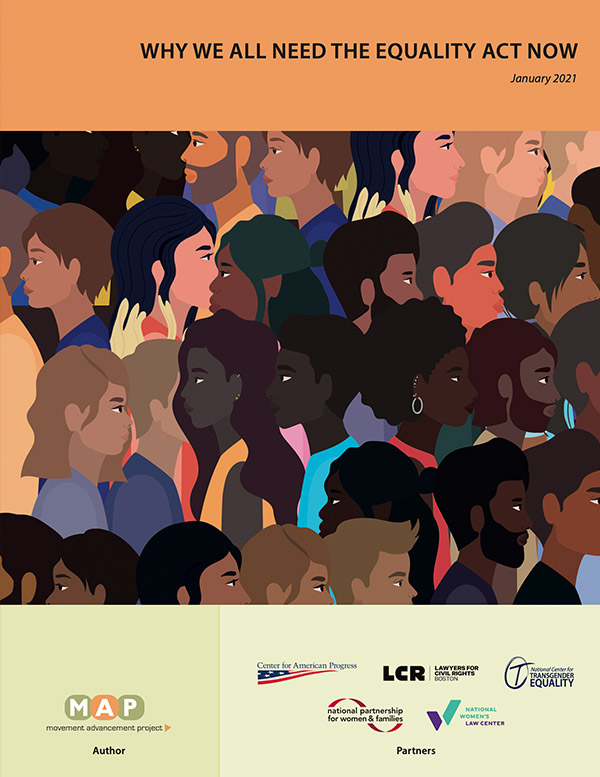New Report Outlines Why We All Need the Equality Act Now

A new report released today, “Why We All Need the Equality Act Now,” outlines the ways in which the Equality Act is vital legislation not just for LGBTQ people, but also for women, people of color, immigrants, and people of minority faiths.
The report highlights the urgency of adding such protections now, especially given the number of public places in which people of color experience discrimination, such as in retail shops and taxi cabs.
This report is authored by the Movement Advancement Project and released in partnership with National Center for Transgender Equality, the Center for American Progress, Lawyers for Civil Rights, National Partnership for Women and Families, and the National Women’s Law Center.
The Equality Act would add new comprehensive and explicit protections to federal law for LGBTQ people, but it would also add and expand legal protections for women, people of color, and many other communities. The Equality Act would update existing civil rights law by filling critical gaps in public accommodation nondiscrimination law for everyone. It would also add nondiscrimination protections for women and LGBTQ people in public spaces and federally funded programs.
Fills Gaps in Nondiscrimination Protections in Public Places
The Equality Act builds on the legacy of the Civil Rights Act of 1964 by expanding the public places where discrimination is explicitly prohibited to include retail stores, bars, taxis and ride sharing, small entertainment venues like bowling alleys, and personal services such as barbershops and salons.
Expanding where discrimination against people of color, immigrants, people of faith and others is prohibited to more of the places people visit daily is critical. Research consistently shows that people of color face unfair treatment while shopping and are more likely to face delays and cancellations in ride share services. For example, two in five shoppers in the U.S. reported experiencing unfair treatment in retail shops because of their race or skin color according to a 2020 survey conducted by Sephora.
Protects Against Sex Discrimination in Public Accommodations and Federally Funded Programs
Many people are surprised to learn that federal law does not currently prohibit discrimination based on sex in places of public accommodation or in federally funded programs. The Equality Act would make these important updates. It would protect against sex discrimination in public places including stopping pharmacies from refusing to fill prescriptions for birth control or preventing dry cleaners from charging women more than men. Additionally, because sexual harassment is a form of sex discrimination, new legal protections in the Equality Act would prevent sexual harassment in restaurants, hotels, and in transportation. Under the Equality Act sex discrimination would be also prohibited in federally funded programs including food assistance, federal contracting, disaster assistance, and more.
Adds Explicit Nondiscrimination Protections for LGBTQ People
The Equality Act will explicitly add “sexual orientation and gender identity” to existing civil rights laws, meaning that LGBTQ people will be expressly protected in key areas of everyday life, including housing, health care, public accommodations, education, and more. Currently 29 states do not have laws that explicitly protect LGBTQ people from such discrimination. Without the Equality Act, LGBTQ Americans remain at risk from being evicted from their homes, kicked out of a business that is open to the public, denied health care or turned away from government services simply because of who they are.
“While the Equality Act is often understood as a bill to prohibit discrimination against LGBTQ people, it does so much more. For example, it’s truly shocking that in our day and age, federal law still doesn’t bar a retail store from kicking out a customer based on the color of their skin. No one should have to live in fear of discrimination simply because of who they are – that’s true for women and people of color, in addition to LGBTQ people. It’s time to update our nation’s laws to make sure everyone is protected as they go about their daily lives, especially during this tumultuous time,” said Ineke Mushovic, Executive Director of the Movement Advancement Project.
Rodrigo Heng-Lehtinen, Deputy Executive Director for NCTE, said, “The Equality Act is critical for the protection against discrimination that it would provide to LGBTQ people, but the positive impact is even broader. The Equality Act also modernizes the Civil Rights Act of 1964 to expand protections against discrimination in public spaces and for services. A lot has changed since 1964 and the Equality Act will close the gaps that have grown since this landmark civil rights law.”
By NCTE and MAP
Explore related topics


Stay Informed
Subscribe to our newsletter to get the latest news and opportunities for action delivered straight to your inbox.
Subscribe

